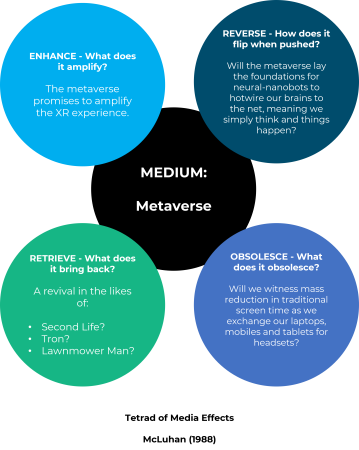Maybe it’s old age creeping up on me, but for the first time, I can remember, I find myself daunted by the ‘reality’ of virtuality. So, when the invitation arrived to chair a panel of metaverse experts at the ARVR Conference in Dublin last week, I couldn’t say no. If you’re going to ‘face the strange’ you might as well jump in with both feet. Right?
As a dealmaker and advisor for media and tech businesses, I’ve been a good boy. I’ve kept my eye on the amount of deal activity finding its way into the metaverse and set up my avatar to wander virtual worlds. I should not have left him alone.
M&A landscape
So, what’s going on? Why is investor cash heading towards the metaverse? What should businesses be doing right now to ensure they’re not heading into a future environment where they may have less control than they do right now? Let’s take a look at the current landscape:
Crunchbase reports more than $2 billion and $62.8 billion have been invested in augmented reality ventures and virtual world projects, respectively, and that’s just last year.
In January this year, the monthly volume of non-fungible token (NFT) sales on the OpenSea marketplace reached an all-time high of $5 billion. Extraordinary.
Earlier this month, Paris Hilton and the Founder of Zoom, Eric Yuan, were among seed investors in IMMI App which valued the business at $50m.
Last month Epic Games announced raising $2billion from Sony Group and Kirkbi, the family office attached to Lego Group. The deal valued the company at over $30billion. Tim Sweeney, CEO and Founder said: “This investment will accelerate our work to build the metaverse and create spaces where players can have fun with friends, brands can build creative and immersive experiences and creators can build a community and thrive.”
In the previous month, Yuga Labs announced its valuation of $4 billion following a $450 million funding round led by Andreessen Horowitz’s crypto fund.
What should businesses consider?
Should all businesses be developing their digital twins? BMW has set up twins of 31 of its factories. Should they think more about NFTs, despite the recent collapse of Terra? Or, is this simply early hype like that seen back in the dot-com era, where a considerable level of investment and related marketing activities were driven more by FOMO (fear of missing out) than JOMO (deriving pleasure from a quiet life, un-anxious about missing out on events happening elsewhere)?
Yes, investor funds are flowing in a metaverse direction, albeit towards gateway tech such as augmented reality (AR) and virtual reality (VR). We are bound to see M&A activities following fundraising. But, are we really going to see the commercial and consumer benefits of a metaverse any time soon? Not just yet.
Think of it like this: We’re at the airport, a big shiny plane awaits us on the tarmac and we’ve had our final boarding call: ”Passengers destined for the metaverse, please ensure you have filled the remaining gaps in your digital transformation programme, sorted those postponed cloud migrations, embraced data analytics, and AI, and have your headset (not facemask!) fully charged and ready to go.”
What would Marshall do?
One of the great media philosophers of the 20th century, Marshall McLuhan, left us with a treasure map. The tetrad of media effects is a means of explaining the social processes underlying the adoption of a new technology or medium. It does this by dividing its effects into four categories, displayed simultaneously.
You can overlay any medium you can think of (print, radio, internet, social), and if the medium speaks to each of the four cornerstones of the tetrad, then the chances are it will achieve mass, global adoption. If we overlay the metaverse, what do we see?

However you look at it, interesting times are ahead and investors think so too. Take a look at the markets and see for yourself. Importantly, it’s not just the new ideas and more futuristic sectors that are receiving attention. It is evident that chip manufacturers, Nvidia, Intel and AMD all expect to benefit from the metaverse. We can see it in the share prices of mobile networks with greater investment in 5G. We also see the impact on platforms with the Big Z leading the charge once more as Meta seeks to evolve ahead of this brave new world.
What would Marshall say?
Marshall would probably have said something like this: “Leaders that avoid uncertainty will soon find themselves operating in a world defined by others.”
So, what’s the message for those facing the strange right now? Jump in and get your feet wet. You can always buy a virtual towel.
Featured image: Neon Carnival / Paris World




























